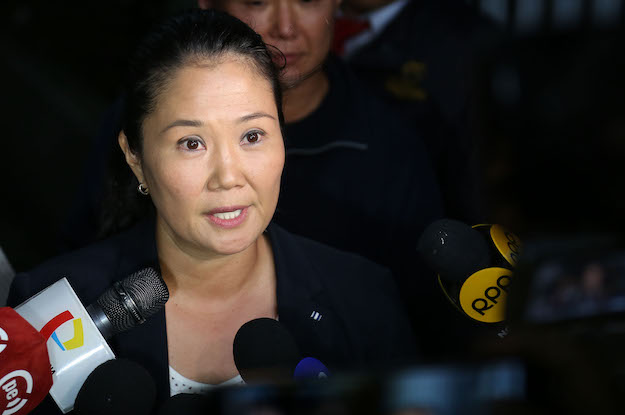LIMA – Until recently, Keiko Fujimori appeared perfectly positioned in the run up to Peru’s presidential election in 2021.
The daughter of 1990s strongman Alberto Fujimori had come a close second in 2011 and 2016, and her Popular Force party’s absolute majority in Congress, which earlier this year forced the resignation of President Pedro Pablo Kuczynski, had made her arguably the most powerful person in Peru.
That makes Fujimori’s recent arrest and the sudden collapse of Popular Force all the more stunning – and consequential to the future of Peru’s democracy.
“This is a fundamental moment,” Arturo Maldonado, a political scientist at the Pontifical Catholic University of Peru, told AQ. “It marks a before and after for the country.”
On Oct. 31, Fujimori was given three years of pre-trial detention on charges of faking campaign fundraising events to disguise illicit donations from Odebrecht, the scandal-racked Brazilian construction firm. A judge ruled that Fujimori appeared to have headed a “de facto criminal organization” within Popular Force, intent on using bribes to take power and then return the favor with juicy public contracts. If convicted, she faces up to 14 years behind bars.
But Fujimori’s plight may be less significant than the massive drop in support for Fujimorismo itself.
Peruvians’ patience with the rampant corruption and bad-faith opposition tactics associated with Popular Force seems to have run out, analysts say. Just three weeks before Fujimori’s arrest, the party was all but wiped out in regional and municipal elections. Diethell Columbus, Popular Force’s candidate for mayor of Lima, epitomized the debacle, receiving just 2.8 percent of the vote.
Meanwhile, Fujimori’s own approval rating cratered in 2018, falling into single figures in some polls.
“Assuming she avoids a long jail sentence, Keiko has a very difficult, perhaps impossible task to rebuild her party,” said Maldonado. “That very vertical way of doing politics has failed, and given that she doesn’t know how to do it another way, the future looks bleak.”
Popular Force’s troubles don’t stop there. Giovanna Peñaflor, who heads pollsters Imasen, told AQ that the Odebrecht case “suggests more extensive money laundering” by the party, including of public funds that vanished during Alberto Fujimori’s presidency. Senior party members, including Keiko, have been caught up in a related massive influence-peddling graft scandal that has rocked Peru’s legal system.
Popular Force legislators are now trying to block the firing of Pedro Chávarry, the attorney general who himself has been accused of corruption, in hopes, critics say, that he will stop various criminal investigations into party members from proceeding.
In addition to corruption allegations, controversy surrounding Kuczynski’s December 2017 pardon of Alberto Fujimori has also done serious damage to Popular Force’s standing.
In a Shakespearean twist, Keiko Fujimori’s public opposition to the pardon, apparently out of fear that it would threaten her grip on Popular Force, has cost her politically. A defining moment came when courts overturned the pardon and her father was ordered back to prison on corruption charges in October. Keiko Fujimori appeared on television crying what many Peruvians dismissed as crocodile tears. “Her weeping like that just generated anger, rejection and incredulity,” said Peñaflor.
Now, with Popular Force lawmakers starting to quit the party – and at least two known to be cooperating with prosecutors – many wonder what comes next. Maldonado believes that Fujimorismo may still have a political future, but probably as a fringe movement possibly led by Keiko’s younger brother Kenji, rather than a party with realistic aspirations of power. “We don’t know who will fill the space left by Popular Force, but I think it is improbable that it would be the responsible right,” said Maldonado.
Unless the remaining three years of Martín Vizcarra’s centrist administration prove successful, some warn of a risk that the 2021 elections develop into a battle of dark horse candidates from the far left and far right.
“Popular Force has been discredited but people are fed up with the entire political class too,” said Maldonado. “It is potentially a very dangerous situation.”
—
Tegel is an independent journalist based in Lima, Peru








